
Relatives of a person who died after contracting COVID-19 mourn April 29 over the casket before the burial at a graveyard in New Delhi. (CNS/Reuters/Adnan Abidi)
Global Sisters Report invited its sister columnists in India to share their experiences of how the terrible outbreak of COVID-19 has affected their country in the last few months. Six sisters wrote special columns, compiled below, describing their experiences and what it is like on the ground as health workers, as tribal citizens, as compassionate caregivers and as victims of the virus themselves.
___
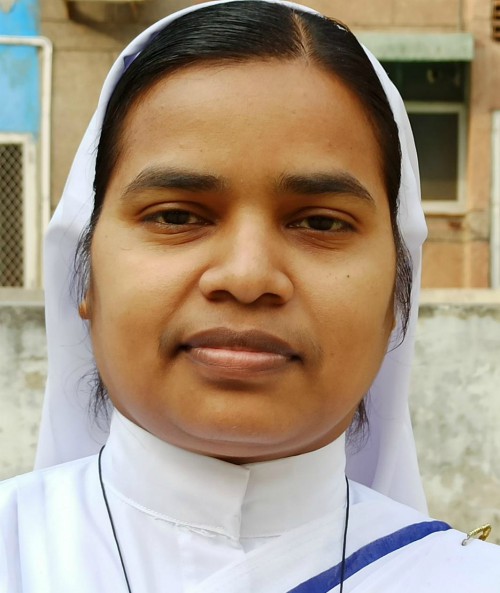 Lalita Roshni Lakra is a Daughter of St. Anne from the Simdega district of Jharkhand, North India. She joined the community right after high school, studying science and social work and finally taking a law degree. She has taught high school science, worked at the Xavier Institute of Management, and served as the province social work coordinator in Ranchi and as a regional secretary of the Conference of Religious India. She is currently an assistant secretary in the Office for Tribal Affairs of the Catholic Bishops' Conference of India and practices law in the district and supreme courts for the Alliance Defending Freedom in New Delhi.
Lalita Roshni Lakra is a Daughter of St. Anne from the Simdega district of Jharkhand, North India. She joined the community right after high school, studying science and social work and finally taking a law degree. She has taught high school science, worked at the Xavier Institute of Management, and served as the province social work coordinator in Ranchi and as a regional secretary of the Conference of Religious India. She is currently an assistant secretary in the Office for Tribal Affairs of the Catholic Bishops' Conference of India and practices law in the district and supreme courts for the Alliance Defending Freedom in New Delhi.
Choking India screams, "More oxygen, please."
Almost all calls and messages shock us with news of death, calls of requests and help, with crying and sobbing. We are tired of responding, "Rest in peace," and exhorting friends to stay home, stay safe, take care, prayers assured! Everywhere, there is breathlessness, helplessness, mourning, sinking hopes and prevailing despair.
People are being treated by the roadsides, in parks and makeshift hospitals with saline bottles hanging on the trunks and branches of trees. The scarcity of medical facilities is scandalous to us; in this tug of war between life and death, death seems to be stronger, swallowing lives. I was stunned to see on the TV news a woman giving oxygen to her infected husband, mouth to mouth. (Ultimately, he died in a car outside the hospital from lack of a ventilator and hospital bed.)
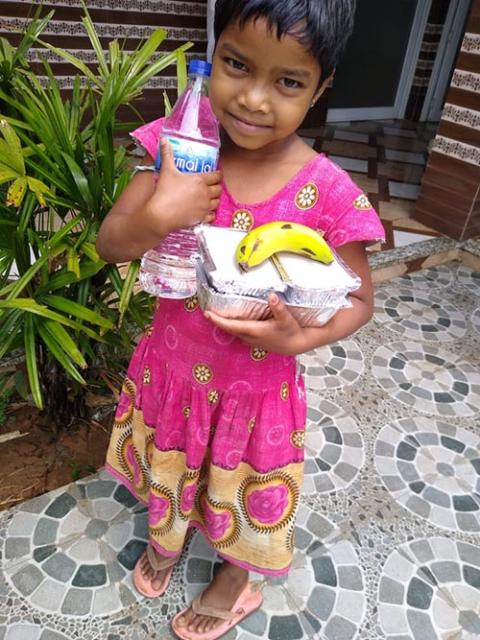
A child holds food and water given by the Daughters of St. Anne. Sisters and novices from several Daughters of St. Anne provinces have been preparing and distributing lunch packets at St. Anne's Hospital & Research Centre in Raja Ulhatu, Jharkhand, India, for the flood of COVID-19 patients from nearby rural areas and villages. (Courtesy of St. Anne's Hospital & Research Centre)
WhatsApp groups, Facebook and other social media outlets, print and electronic media feature sad stories frequently. More than 100 priests and religious and four bishops have died so far in India. Five priests died in the state of Gujarat in 15 hours. Two sisters of the same congregation, both on the leadership team, died of COVID-19 in two days in the same hospital. I was broken because I had worked with both of them.
One of our kitchen staff lost her husband and daughter on the same day. A parishioner died the day before her daughter. A wife died, but the husband in the ICU does not know it.
As a tribal woman religious, I am saddened that we have lost many young tribal scholars and intellectuals in the pandemic, mainly from Jharkhand, Madhya Pradesh, Chhattisgarh, Gujarat and Odisha.
I managed to talk to the members of a family affected by COVID-19 in my village in Jharkhand. They said: "Sister, we can't afford to go to hospital as we are poor. We will die of this virus at our home itself. For us, no medicines are available at an affordable price. We don't have single rooms in our homes to be quarantined."
It is in this context that I, as a Catholic and religious, am pondering how to revive hope in people who trust in the divine power and existence of God and how to help people to deepen their faith in the Lord.
How and where to get courage and strength? Sometimes, like Jesus' apostles, I ask: "Where are you, Lord? Why have you forsaken the world and me? Lord, come to save our world and family. 'Lord, save us. We are perishing' " (Matthew 8:25).
But maybe those are the wrong questions. Now, I am asking, "Lord, how are you present to us amid this pandemic reality?" In my spiritual attempt to protect my world from COVID-19, I find that Psalm 91 is helpful in giving me faith.
I have seen people helping enemies; oxygen cylinders being distributed thanks to generous help from several different countries; those who are well praying for the sick. Many families who did not pray are now on their knees, praying with great trust and faith; many are finding solace in online Masses, the divine mercy rosary, and adoration. I composed a Hindi hymn for the intercession of Mother Mary Bernadette, our founder, who served during the cholera epidemic of 1895.
Let us "be positive but test negative."
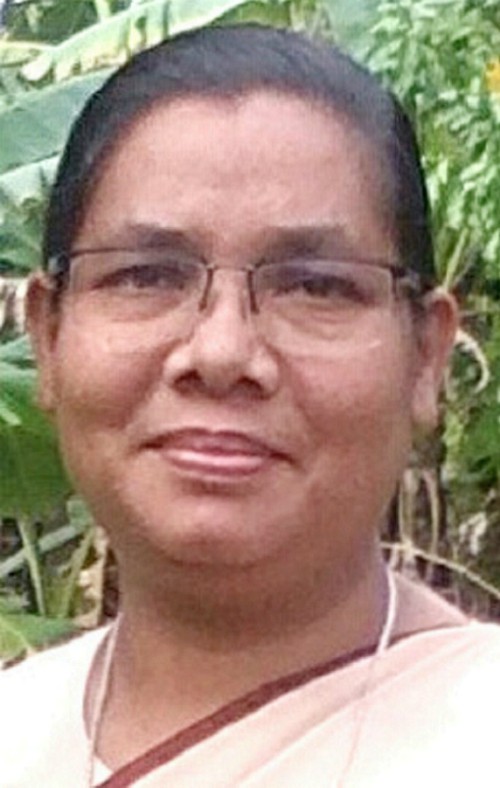 Frida Toppo is a Missionary Sister of the Immaculate from Chhattisgarh, Eastern India. Educated by the Sisters of Mercy of the Holy Cross, she began her ministry teaching in a school of the Indian Missionary Society fathers and has continued teaching for 15 years in different schools. She also completed a degree in history and currently works in Loyola School, Bishnupur, run by the Jesuits in the Imphal Archdiocese, Manipur state, Northeast India. She also serves as the animator of the Maria Niketan community in Bishnupur.
Frida Toppo is a Missionary Sister of the Immaculate from Chhattisgarh, Eastern India. Educated by the Sisters of Mercy of the Holy Cross, she began her ministry teaching in a school of the Indian Missionary Society fathers and has continued teaching for 15 years in different schools. She also completed a degree in history and currently works in Loyola School, Bishnupur, run by the Jesuits in the Imphal Archdiocese, Manipur state, Northeast India. She also serves as the animator of the Maria Niketan community in Bishnupur.
At the beginning of the second wave of the pandemic that began in April, the federal government failed to contain it with firm political will, policies and strict rules to contain the spread, and the people did not follow health protocols. This has caused havoc. Poor health, economic poverty, and thousands of daily deaths have stunned the people, and the whole country — rich and poor, the young and aged — is in danger.
Now, the nation, state and district levels of the health system are in chaos. Poor women with low immunity and undernourished children have to fend for themselves for health care needs. In remote villages, the health care infrastructure is very poor, with inadequate health care centers that lack basic medical facilities and are often understaffed. The pandemic has added insult to injury.
Sick people in rural areas have no transport to the hospital. Hospitals have a shortage of beds, doctors, nurses, staff, oxygen, medicine and personal protective equipment for health care professionals. Patients lie in the courtyard, many by themselves, with no one to assist them. Everywhere, there is pain, distress, anguish and tears.

A woman cries in the arms of a relative April 26 outside a hospital in Ahmedabad, India, after her husband died from COVID-19 complications. (CNS/Reuters/Amit Dave)
Almost every family has positive COVID-19 cases. Death is imminent, and this is affecting every individual with insecurity, emotional confusion, isolation and stigma.
There is economic distress because of closed education institutions and the loss of work and jobs, adequate medical response and basic necessities — almost beyond one's imagination to bear.
Life has become helpless and hopeless as fear and anxiety spread everywhere. This has resulted in a range of emotional reactions: distress, psychiatric conditions, unhealthy behaviors, depression and anxiety. Beyond the stress inherent in the illness, mass stay-at-home orders, quarantine and isolation have made life boring, stressful and painful.
India has become a place where patients are dying like animals inside and outside of hospitals, waiting for doctors and treatments.
Every morning, I hear about more cases of COVID-19 and the increasing death rate. I hear about the deaths of many priests and religious sisters.
Everywhere, there is pain, distress, anguish and tears. Almost every family has positive COVID-19 cases. Death is imminent.
"I am filled with fear, stress, depression, confusion, frustration and anger," said Fr. Isidore Baa, a religious priest of Third Order Regular, a Franciscan whose brother, mother, niece and nephew are sick. "I am tired of life. I surrender everything in the hand of God." (While this was being written, his elder brother died, leaving behind a wife and five children.)
Sadly, it is getting worse because the government and the people are still not taking it seriously enough. Amid all the fears, the government allowed one of the largest religious gatherings in the world: Kumbh Mela (the pitcher festival), the weekslong major Hindu festival in India in Haridwar city along the Ganges River in the northern Uttarakhand state. This was another super-spreader event: Out of 61 returned pilgrims in Madhya Pradesh, 60 tested positive for the virus. And there were 9.1 million participants in Kumbh Mela!
The recent election in the five provinces/states was the second reason for the vast spread of COVID-19, as politicians and people attended hundreds of political rallies and campaigns, defying all health protocols — few masks, little social distancing.
To battle the pandemic, the government, international community, civil society groups, religious groups and people from every walk have to be united. We have to appreciate the preciousness of life more than ever.
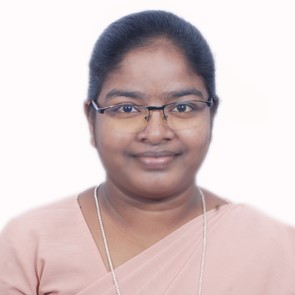 Monica D'silva is a sister of Our Lady of Charity of the Good Shepherd from the Province of South West India. She completed her degree in nursing from St. Martha's College of Nursing, affiliated with the Rajiv Gandhi University of Health Sciences, in Bangalore, and also obtained a diploma in theology from Jnana-Deepa Vidyapeeth, the Pontifical Athenaeum in Pune. She has been working in St. Martha's Hospital for about two years; currently, she is working in the COVID-19 ward of that hospital.
Monica D'silva is a sister of Our Lady of Charity of the Good Shepherd from the Province of South West India. She completed her degree in nursing from St. Martha's College of Nursing, affiliated with the Rajiv Gandhi University of Health Sciences, in Bangalore, and also obtained a diploma in theology from Jnana-Deepa Vidyapeeth, the Pontifical Athenaeum in Pune. She has been working in St. Martha's Hospital for about two years; currently, she is working in the COVID-19 ward of that hospital.
As a nurse working at St. Martha's Hospital in Bangalore amid the pandemic in India, I am witnessing the cry and misery of our people every minute, every day, but hoping for a better tomorrow.
I love my profession and derive daily strength from my Lord, who called me to this healing ministry. I never expected a pandemic would challenge me personally as a young religious.
In March 2020, we began to see the COVID-19 cases in our hospital. Working in the COVID-19 ICU, I encountered the agony of my brothers and sisters on their deathbeds. Being a front-line warrior gives me mixed emotions: excitement at seeing critical patients recover, and grief over the deaths that take place before my eyes.
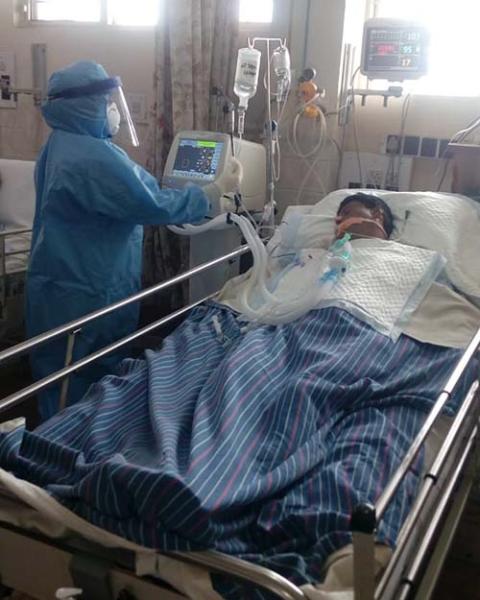
Our Lady of Charity of the Good Shepherd Sr. Monica D'silva tends to a COVID-19 patient at St. Martha's Hospital in Bangalore, India. (Courtesy of Monica D'silva)
The health care team has worked around the clock to save every precious life. Six hours of regular duties and 12 long hours of night shift with high-level personal protective equipment left us drenched with sweat. Some of my colleagues were not able to see their beloved family members for months; even I stayed away from the community in consideration of the elderly sisters' well-being.
In October, I contracted COVID-19, enduring the trauma of the symptoms but never losing hope. I remained positive, casting all my fears and worries to my Shepherd God, and began living every day with an experience of healing and caring.
After 14 days of home quarantine and treatment, I sprang back again as a front-line warrior. I realized that the experience of being a COVID-19 patient myself gave me a better understanding of the suffering of thousands of other patients.
The second wave of COVID-19 began in full swing in March 2021. It is much worse than the first. Working at the emergency room's flu desk, I encountered people coming in tears to receive treatment — sometimes a number of them from the same household.
If no beds are available, we still receive the sick patients, stabilize them with primary care, including oxygen and medication, and release them, but the cry of the relatives not to send them out and begging us to lay them in any corner on the floor and treat them — that still echoes in my ear.
This pandemic made the rich richer, but the ordinary man became penniless. Every walk of life has been shaken and brought to an abrupt halt. The hospitals are filled with COVID-19 patients and have no more beds for new cases, and there is a dire shortage of oxygen all over the city and country. Thousands of the dead have left us with no place to even cremate or bury our dead.
Can you hear our cry?
My brothers and sisters, let us be united in one spirit, supporting each other as we go through these difficult moments. Even now, as broken as you may feel, you are still so strong. You hold yourself together and keep moving, even though you feel shattered. Don't stop. This is your healing. It doesn't have to be pretty or graceful.
You just have to keep going!
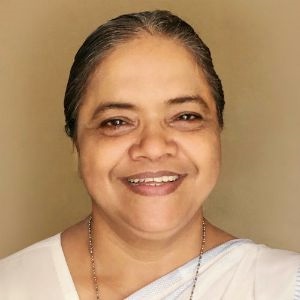 Margaret Gonsalves belongs to the Sisters for Christian Community, Washington, D.C. She is active in church and theological fora. As founder of ANNNI Charitable Trust, she works to empower Indigenous girls and women, offering residential programs in English and sustainable development skills in India.
Margaret Gonsalves belongs to the Sisters for Christian Community, Washington, D.C. She is active in church and theological fora. As founder of ANNNI Charitable Trust, she works to empower Indigenous girls and women, offering residential programs in English and sustainable development skills in India.
On March 20, I developed a cough, headache, sore throat, cold-like symptoms, conjunctivitis and fatigue. I feared going to the hospital because I know people who went there and did not return.
I take little medicine, so I called a neighbor to get me something, but at 9 p.m., there was still no medicine. In desperation, I walked to the medical shop and got a strip of Cheston Cold. Around 1 a.m., I began experiencing a mild breathlessness. Immediately, I pressed acupressure points for asthma and did some ujjayi-type pranayama.
How can I be a breath of fresh air to the COVID-19-struggling humanity? Those not afraid of death can bring much-needed oxygen of hope to fearful, breathless souls.
By 3 a.m., I could breathe the breath of new life from the cosmic womb and slept well, but I woke at 9:30 without enough energy to make a cup of tea. Here is where I felt the pinch of being alone but not lonely. I did not want to call the hospital, thinking the medical system is a corrupt money-making racket.
I tapped into inner resources. Every day, I increased 15-minute segments of meditation with breathing and pranayama. I disconnected from many social media groups like WhatsApp — the depressing news about ill treatment of the farmers, injustice and brutality were overwhelming. The government-controlled media was promoting ruling party politics and not bothering about supplying vaccinations.
I quarantined myself for three weeks. I ate a high-protein diet, inhaled a lot of hot steam, took vitamin C and multivitamins, asked for a lot of prayers. Drawing inspiration from Louise Hay, who healed herself from life-threatening sickness with paracetamol, I healed myself with only three Cheston Cold tablets.
On April 15, my sister and her daughter called, needing a place to stay: Her son and his mother-in-law were home with COVID-19. I consulted my family doctor, who advised me to get vaccinated first. But I was deeply moved with pastoral concern for the needy.
Advertisement
I began reading the news again and drew hope from the critical reviews of government failure to care for the people. I began to realize the importance of art and humor in the fight for freedom, especially the powerful articles by prophetic female writers.
"We need a government. Desperately," says Arundhati Roy. "And we don't have one. We are running out of air. We are dying. We don't have systems in place to know what to do with help even when it's on hand. What can be done? Right here, right now?"
India has been exporting vaccines to the world, and we have to be satisfied with the crumbs! Men are busy fighting elections, erecting statues and temples, and traveling at great cost. Too long, the male voice has dominated both church and civil society. We in India are in dire need of caring mothers who would think of their children first and then politics, like Mamata Banerjee of Bengal. Working for the underprivileged and downtrodden, she is called "mother of the motherland" of the people of Bengal.
I said prayers of gratitude for life, changing my perspective toward death. How can I be a breath of fresh air to the COVID-19-struggling humanity? Those not afraid of death can bring much-needed oxygen of hope to fearful, breathless souls.
This mild COVID-19 attack helped me understand the Lenten practice of kenosis, self-emptying. Kindness brings oxygen to the air. The rise of prophetic female political leaders will provide oxygen and plant seeds of health for all.
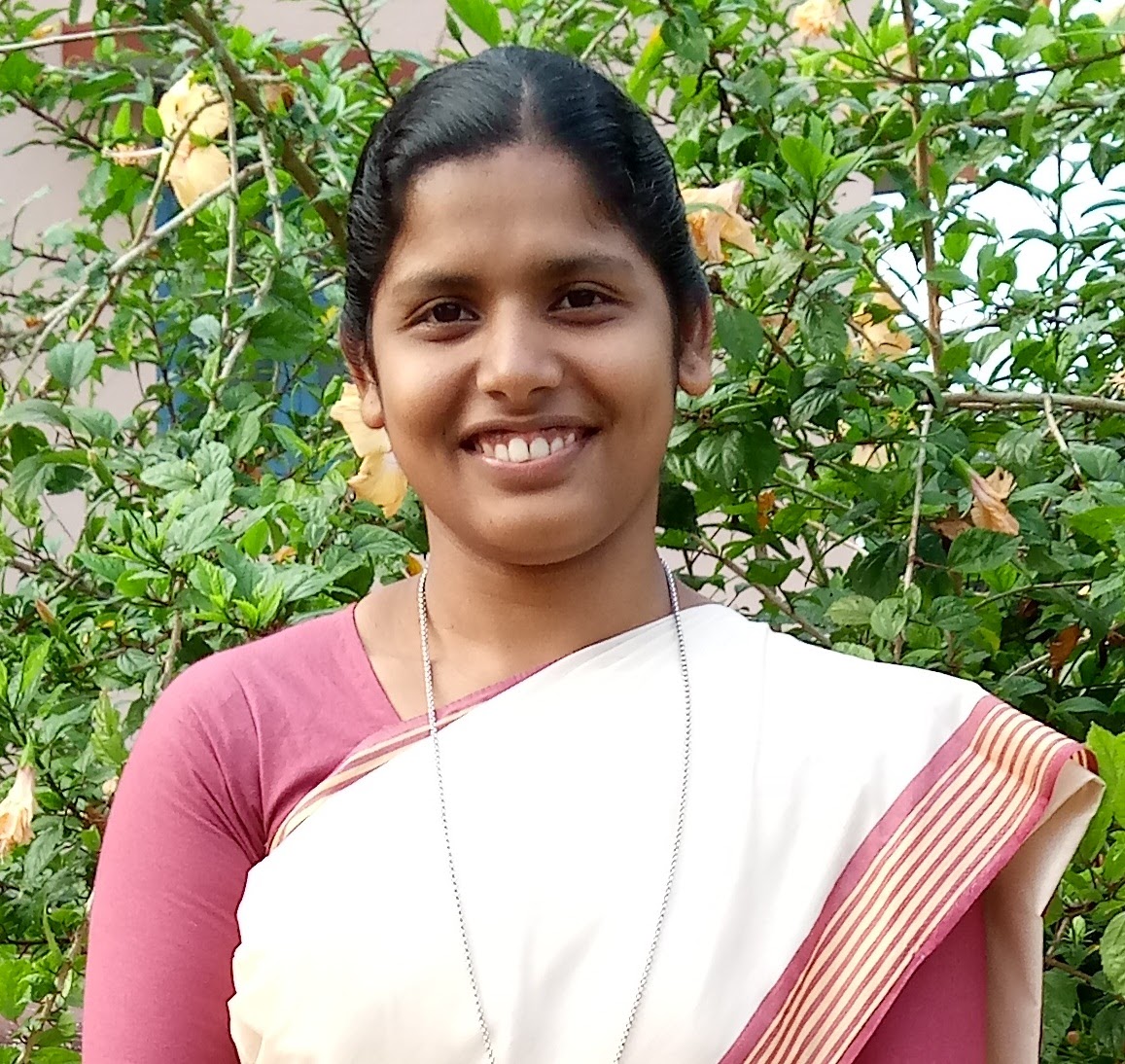 Mini Amalolbhavam belongs to the Medical Mission Sisters, South India Province. As a young woman, she longed to help those suffering and living in poverty. On hearing about the Medical Mission Sisters during a diocesan vocation camp, she decided that would be a way to extend her service to the needy in a committed way. While spending a year at Ayushya, a Medical Mission Sisters' center for healing and wholeness in Kerala, she became more aware of the brokenness of the world and its great need for healing. She is currently pursuing two graduate degrees.
Mini Amalolbhavam belongs to the Medical Mission Sisters, South India Province. As a young woman, she longed to help those suffering and living in poverty. On hearing about the Medical Mission Sisters during a diocesan vocation camp, she decided that would be a way to extend her service to the needy in a committed way. While spending a year at Ayushya, a Medical Mission Sisters' center for healing and wholeness in Kerala, she became more aware of the brokenness of the world and its great need for healing. She is currently pursuing two graduate degrees.
India started its fight against the COVID-19 pandemic just over a year ago, and now, the second wave has hit very hard, with more than 400,000 new cases on May 1.
It is hard to see one person left in a family while others die of the coronavirus; it is hard to see the mass cremations without even knowing the identity of the individuals.
India began its vaccination drive in January 2021. The Serum Institute of India is the world's largest vaccine manufacturer, designed to supply vaccines to the whole country of 250 million people, and was also exporting vaccines to other countries that needed vaccines. Barely 10% of the people of India had been vaccinated when the country began to face a shortage of vaccines.
Our hospital in South India, Immaculate Heart of Mary Hospital (Marygiri), the first Syro-Malabar Catholic hospital in Kerala, is run by my community, the Medical Mission Sisters.
The hospital began doing COVID-19 tests in July 2020, when positive cases were very low, and to fulfill government mandates, they made 10% of their beds available for COVID-19 patients. But during the second wave, the hospital has been struggling to treat COVID-19 cases. Now, the government demands that 25% of beds be set aside.
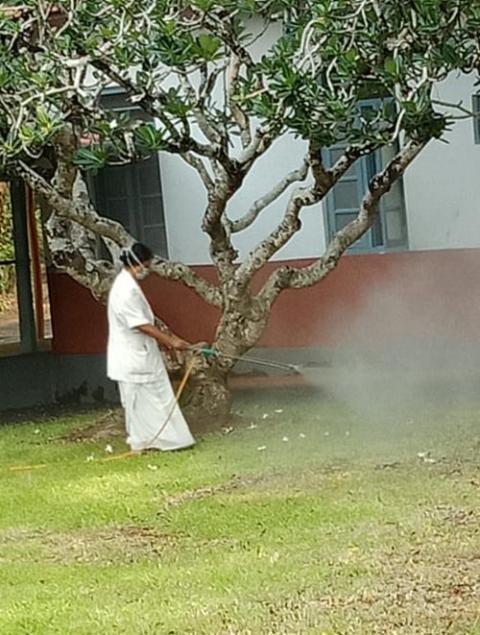
Medical Mission Sr. Annie Vettukattil, nursing superintendent, sanitizes the surroundings of Immaculate Heart of Mary Hospital in Kerala, India, in the absence of ground maintenance staff. (Courtesy of Mini Amalolbhavam)
While the hospital can supply oxygen, it does not have ventilators and has to refer patients to other hospitals. But other hospitals don't have beds, either. The hospital is required to test any patient who comes to the hospital, and the majority of them are positive cases. These patients are not allowed to be accompanied by their own helpers, and with the lack of staff, it is challenging for the hospital to respond to their many needs while calling back and forth to find available beds elsewhere.
It is overwhelming for the Immaculate Heart of Mary Hospital to find ways to cope with this unmanageable and uncontrollable condition. The hospital management also tries to provide the people from the economically lower strata with materials like food, masks, clothes and reduced medical charges.
It is hard to see one person left in a family while others die of the coronavirus; it is hard to see the mass cremations without even knowing the identity of the individuals, with family members and relatives left in suspense. These people have already suffered through lockdown without enough food and necessary supplies available.
Trying to respond to needs according to the advice of our founder, Mother Anna Dengel — "As Medical Missionaries, the needs and sufferings of humanity must find an echo in our hearts" — the sisters commit themselves ardently in serving God and his people, even though of the 15 sisters working in the hospital, only three are younger than 60. Those sisters who are not directly at the forefront in fighting the coronavirus support the others through their prayers. Trusting in God's providence, they continue their journey of being a presence of Christ the Healer.
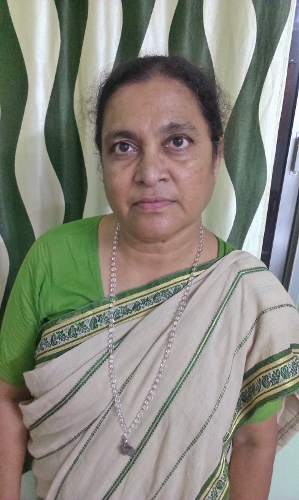 Dorothy Fernandes is a Sister of the Presentation of the Blessed Virgin Mary and a social activist who has been working in Patna since 1997 with communities on the periphery with the goal of making their cities inclusive so no one is left behind. She also serves as the chairperson of the women's commission for the Patna Archdiocese and is the advisory member of the social wing of the archdiocese, Forum for Social Initiatives.
Dorothy Fernandes is a Sister of the Presentation of the Blessed Virgin Mary and a social activist who has been working in Patna since 1997 with communities on the periphery with the goal of making their cities inclusive so no one is left behind. She also serves as the chairperson of the women's commission for the Patna Archdiocese and is the advisory member of the social wing of the archdiocese, Forum for Social Initiatives.
"An overconfident government that has failed its people" is what rings in my heart as I sit and reflect on what is happening to this beautiful country of ours in which we took pride. I am shocked, to say the least.
After the first wave of the pandemic was over, instead of preparing and making arrangements for the second wave, the emphasis was on the greed for power: addressing huge gatherings in election campaigns without abiding by any safety protocols. Most of the people who attended these rallies were not just the poor, but the leaders who yelled over the public address system about wiping away others in power. At a time when the central government should have been busy giving orders and assessing the grave situation, they were out to garner power at the cost of lives.
There were huge gatherings for three days at the Kumbh Mela, where devotees were seen in the rivers without masks and not socially distanced as if in a trance. We have lost all sense of values, caring for others. It hurts and pains that we have just become incapable of addressing this mess.
We see all hell let loose: people running with their loved ones for oxygen, medication, beds, ambulances. Everything in short supply and the stress under which the health workers and front-line services are working around the clock tell us how callous our government has been.

A doctor at Holy Family Hospital in New Delhi looks at a patient's X-ray May 1 amid the coronavirus pandemic. (CNS/Reuters/Danish Siddiqui)
Last year, many of us moved out, throwing caution to the winds and just responding the best we could to human need. This year, it is simply impossible to move out; our communities on the periphery have also begun to realize that they will have to become independent and learn to manage their lives. Stepping out of the house is not permitted. It's not just the matter of you going out; it's returning home, where you have family, community. The virus is everywhere; no one knows who is a carrier, so be careful, be sensible, be responsible.
But then, what happens to those who are delivering goods and have to work, who are bringing vegetables to our doors, who work in grocery shops that are open? They risk their lives to keep us alive. Humanity needs to bow down in hope and gratitude to all those in public service, the police force and the cleaners who risk everything.
Then there is the story of an 83-year-old man in Nagpur in the state of Maharashtra who tested positive and was being treated in a hospital. A young woman came in crying, looking for a bed for her husband, 40, who had tested positive. Hearing this, this elderly man was moved. He said, "I have lived my life. This lady needs her husband. I will give him my bed." He signed the papers and agreed to move out. Three days later, he breathed his last at his home.
Other such stories raise our heads and hearts, and I fall humbly before this our God who has kept the humanity in us alive.





